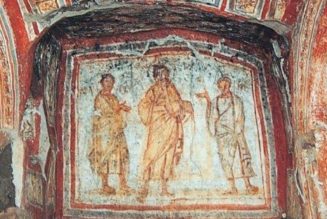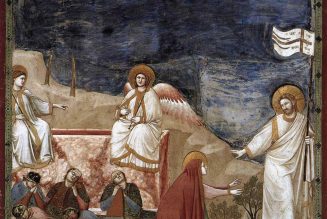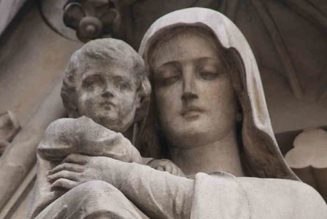By Dr. Jeff Mirus ( bio – articles – email ) | May 21, 2024
I can remember, from my boyhood in the 1950s, when normal business was suspended on Sundays, the stores would close, and most people would (if only for the sake of a kind of cultural propriety) “go to Church”. And I can remember also when the stores began to be open on Sundays, and how over the years our family began to shop on Sundays, if not with complete comfort, at least with increasing frequency. By the mid-1960s, of course, we lived in an entirely different cultural world. But to be honest, this was usually not the difference between intense religious conviction and religious disbelief. It was mostly a difference in cultural expectations—a difference in how, as a society, we dealt with the reality that most of us no longer took Christianity personally, and had not done so for quite some time.
I suspect that even most believing Christians somewhat undervalue the importance of keeping the Sabbath*, or even more than a few special Christian feasts. This widespread neglect has even been officially reflected through the deemphasis of pre-Communion fasts, the reduction of Friday penitential practices, the increasing emphasis on Saturday evening Masses (so that Sunday can be a “day off”), and the reduction of Holy Days of Obligation (and their frequent conflation with the Sundays that follow them). Despite a rich liturgical calendar, most Catholics only rarely inculcate reverence for God through a careful, intentional orchestration of their daily human perceptions, observances, and celebrations.
Doing so, however, ought to be an important exterior step toward the interior “practice of the presence of God” which is so important to personal spiritual development. Another great advantage of taking this more public and visible step is that it enriches not only our own personal Christian sensibilities but also those of the family members, friends, and even business associates who notice or even participate in our spiritual focus. Moreover, it is extraordinarily rare for interior spiritual growth to continue to develop if this growth and awareness is not expressed culturally—which is to say bodily and socially, privately and publicly, personally and corporately, through all the dimensions of human life.
Family and friends and the larger culture
One of the possibilities we emphasize here at CatholicCulture.org is what Jennifer Gregory Miller calls “liturgical living”—that is, a continuing mindfulness of the seasons and feasts of the liturgical year as observed not only through Mass and particular devotions but also through various activities and practices at home—not excluding the preparation of meals which reflect something about the particular feasts or saints days that we observe. Many of these practices can be developed most effectively with children in mind—as a part of their immersion in a Catholic culture of “Church and home”. But adults have a special responsibility to engage in an intentional festal (and appropriately sacrificial) way of life which is most suitably geared to the daily, weekly, and seasonal rhythms of the Catholic liturgical year. In many cases, again, this can and will spill over into conversations with and gatherings of extended family, friends and business associates.
Many of us can still remember the impact of “receiving ashes” on Ash Wednesday, including the small but effective witness this offers to a secular culture if we simply refrain from washing them off as soon as we leave the Church. An important first step is taken simply by being unashamed to allow evidence of a genuinely Catholic sensibility to be naturally visible outside the home. This is a visibility that ought first and foremost to be evident in the way we act and the very words we use in speaking with others, including greetings and blessings. Certainly the décor of our homes, and whenever possible our offices, ought to offer multiple reminders of a Christ-centered way of life. And it is inescapable that a Christ-centered way of life should be evident in various external or cultural ways during different seasons and on different kinds of days throughout the year.
A change in how we “use” Sundays might be a first step. If Sunday refreshment only means watching sports or movies, with little or no recognition of the Father, Son and Holy Spirit, then we have seriously impoverished our own souls and those of our family members through a (more or less) conscious decision to focus on entertainments which distract us from the incomparable richness of Jesus Christ. This does not mean we should not genuinely relax on the Sabbath. It just means that we need to school ourselves to relax with the Trinity, the angels and the saints, in a genuine awareness of the greatest gifts we have received, rather than in our own personal “pleasure cocoons”. It is this sort of awareness which will shape appropriate Christian emphases not only on Sundays but on each day of the week.
Burdensome?
I think we all know that at times this can seem burdensome. After all, everything I have written here originates in a commandment of God, and His commandments often seem initially burdensome; they prove to be liberating primarily in the way they transform us over time. For one thing, we humans must learn that the flight from God does not bring rest, but rather rest is found by participating in God’s own life. From the very beginning, we learn in Genesis that God rested from the labor of Creation on the seventh day, and from this great reality stems God’s corresponding invitation to join Him in this rest. Thus we learn about keeping the Sabbath in the second Biblical book, the Book of Exodus:
- In chapter 20, verse 8: “Remember the sabbath day, to keep it holy.” Here the commandment is expressed clearly as one of what we might call the natural laws of human existence, in recognition of our Creator.
- And in chapter 34, verse 21 we discern its purpose of keeping us united with God: “Six days you shall work, but the seventh day you shall rest; in plowing time and in harvest you shall rest.” In the surrounding text, the commandment is enumerated as essential to the formation of a culture which is in direct opposition to that of the pagan peoples whom God is directing the Jews to displace, lest they be corrupted into the worship of false gods.
And then, in the Book of Deuteronomy, the Jews are reminded of the importance of the Sabbath observance as a reaffirmation of their unique and very special identity as God’s special people. It is not only a matter of human rest but of a participation in the freedom and holiness of God Himself:
Observe the sabbath day, to keep it holy, as the LORD your God commanded you. Six days you shall labor, and do all your work; but the seventh day is a sabbath to the LORD your God; in it you shall not do any work, you, or your son, or your daughter, or your manservant, or your maidservant, or your ox, or your ass, or any of your cattle, or the sojourner who is within your gates, that your manservant and your maidservant may rest as well as you. You shall remember that you were a servant in the land of Egypt, and the LORD your God brought you out thence with a mighty hand and an outstretched arm; therefore the LORD your God commanded you to keep the sabbath day. [Dt 5:13-15]
In the fullness of time, when Jesus Christ Himself spoke of the commandments, He enumerated the human evils to be rejected, which encompass the last seven of the ten commandments (Mt. 19:16-19), and St. Paul covers them again in his letter to the Romans (13:8-10). These are also seven specific enumerations of the natural law, which are as evident to human nature unblinded by sin as is the existence of God Himself. It is precisely in the human observance of these commandments, and the formation of the attitudes and habits they create in us, that we begin to experience the freedom of God.
But Our Lord also grouped all ten commandments under the two great commandments (Mt 22:34-40). Thus the first three are subsumed under the very first overarching commandment: “You shall love the Lord your God with all your heart, and with all your soul, and with all your mind. This is the great and first commandment.” Meanwhile, those obviously very human commandments enumerated earlier are grouped under the second: “You shall love your neighbor as yourself.” Thus everything in the commandments detaches us from sin and serves to foster that habitual union with God which St. Paul calls “glorious liberty”:
For the creation waits with eager longing for the revealing of the sons of God; for the creation was subjected to futility, not of its own will but by the will of him who subjected it in hope; because the creation itself will be set free from its bondage to decay and obtain the glorious liberty of the children of God. [Rom 8:19-21]
Beginning with the Sabbath
Our Lord said of the two great commandments which encompass all of the others: “On these two commandments depend all the law and the prophets.” In other words, the enumeration of the Ten Commandments is a point-by-point list of our rudimentary spiritual and moral obligations in loving God and neighbor. But clearly the full range of this challenge cannot be listed in a finite series of things to do and things to avoid. With respect to the first of the Ten, of course, we ought eventually to realize that anything which elevates a “strange god” strikes at the heart of the entire project. But it may take many years of spiritual growth before we see things that clearly, and recognize the full range of implications.
Nonetheless, this range of the whole project of becoming holy as God is holy is never less than, nor exclusive of, the specifications of the Ten Commandments, which are foundational points of emphasis for effective spiritual development. In this sense, the Ten Commandments are an initial framework for understanding and eliminating strange gods, for achieving at long last that love of the one true God within which alone every other love is properly ordered, and within which alone every other love becomes selfless and pure.
But we humans really do need starting points, and steps, and examples, and effective practices. Of these the first and almost certainly the most effective and most important practical starting point is the human habit of observing the Sabbath. This is the habit of deliberately setting aside purely human concerns in order to recognize and rejoice in the love of the Father, Son and Holy Spirit. Our Catholic Sundays and Holy Days will introduce us to the mysteries of our salvation and both the blessings and the challenges of life in Christ.
As time goes on, an intentional progression ought to lead to greater familiarity with and immersion in God’s salvific purposes as represented by the seasons of the liturgical year. Moreover, we will be specifically, fruitfully and vocationally inspired by the commemoration of the many saints who have shown us what it means to go beyond the Ten Commandments into unique personal vocations which bind us to God in love. Keeping the Lord’s day holy is the way God has asked us to begin. As the history of the modern West reveals once again, to choose to ignore this invitation is to distance ourselves deliberately from the love of Christ.
* I was put in mind once again of this progressive loss of Sabbath observance by the arrival of a new book published by Sophia Institute Press, written by a remarkable teacher, Daniel Fitzpatrick. The books is Restoring the Lord’s Day: How reclaiming Sunday can revive our human nature. I’ve read only the preface and the first chapter, so I can hardly offer a review at this stage, but the topic seems to me extraordinarily important.
Sound Off! CatholicCulture.org supporters weigh in.
All comments are moderated. To lighten our editing burden, only current donors are allowed to Sound Off. If you are a current donor, log in to see the comment form; otherwise please support our work, and Sound Off!










